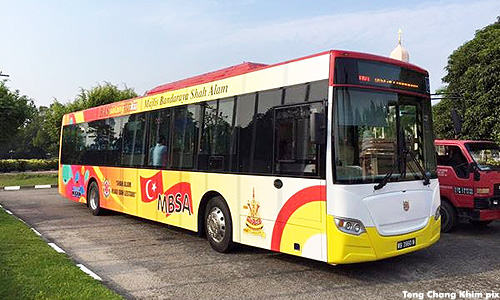LETTER | Go KL was launched on Aug 31, 2012, by the Land Public Transport Commission (SPAD). It was the first free bus service in the country covering two routes in Kuala Lumpur. The route from KLCC to Bukit Bintang was named the Green Line, and Purple Line from Pasar Seni to Bukit Bintang.
Two additional routes were launched on May 1, 2014. The Red Line from KL Sentral to Jalan Tuanku Abdul Rahman and Blue Line from Medan Mara to Bukit Bintang.
All four routes are within the central business district of Kuala Lumpur with 65 stops for passengers to hop in or out of the buses. Rich and poor Malaysians, foreign workers and tourists travelling in Go KL buses would naturally be happy, but not for those missing out on these free rides.
They include Malaysians travelling on other routes and taxpayers who think their contribution to the government’s coffer could be better utilised.
In 2014, free bus services were launched by the Shah Alam City Hall in March and by the Petaling Jaya City Hall in July.
The Selangor state government then got into the act by launching “Bas Selangorku” on July 1, 2015, to serve parts of Shah Alam, Subang Jaya and Klang.
On April 26, 2016, The Star published a report “Poor response to Klang’s free buses”. After nine months of operations, Klang Consumer Association president A Devadass said it was a waste of public funds as the buses were not serving the needy and the old folk.
But by Sept 24, 2017, the Selangor state government launched the 100th “Bas Selangorku”, now known as “Smart Selangor Bus”. It entered the Malaysia Book of Records for "Most Number of Free Shuttle Bus Services Provided by a State Government” with 546,661 passengers in 2015, 4,163,654 passengers in 2016, and 6,024,044 passengers until Aug 31 last year.
Selangor Mentri Besar Mohamed Azmin Ali said the total cost for the Smart Selangor Bus programme until last September was RM42.53 million, with RM33.53 million paid by the state government and RM9 million by local authorities.
Buses are like moving billboards and having an organisation’s name or message on them is extravagant if used to boost the ego. Many of those who have invested in tour buses found out too late the returns do not justify the money and time invested.
Likewise, state governments must take cognisance of the hidden costs before using free bus service to win popularity contests. Moreover, the large number of foreign workers and tourists that have enjoyed free bus service are not translated into votes.
It would be much better to provide free bus services or concession fares to interested Malaysians that qualify. A good example is the MyRapid Touch 'n Go card that offers concessions to senior citizens, disabled and students.
Spad should introduce and install standardised card payment machines on all stage buses in Peninsular Malaysia, starting in the Klang Valley. State governments that wish to offer free bus rides to local residents could issue bus cards to qualified applicants.
In this way, commuters could travel anywhere within the state and not be limited to routes operated by free buses, which are running empty half the time. Stage bus companies could easily increase frequency to cope with any rise in demand.
Each time the cards are read by the payment machines, the normal fare or agreed rate would automatically be charged to the issuer and credited to the stage bus company. Passengers would be more appreciative if they could view online the total fares they have clocked.
It is a fallacy to think that leasing and repainting buses to provide free service would show a state government is caring. It backfired when seen as a wasteful exercise and scorned by the majority who do not get to use it.
Recently, it was reported that the Subang Jaya Municipal Council (MPSJ) was still waiting for a new agreement with Smart Selangor Bus from the state government.
At a council’s full board meeting, councillor Pooi Weng Keong said the agreement between MPSJ and RapidKL on the lease of buses to provide free services ended last year, but there has not been an extension or renewal to date.
He disclosed the council’s audit committee was informed that the legal department had not received any draft agreement or further instructions from the town planning department on the matter, and wondered which department was responsible to draft a document or agreement.
MPSJ president Noraini Roslan informed the town planning department has not received an official reply from the state government on the matter and is, therefore, unable to present the necessary documents to the legal department for drafting the agreement.
She urged the two departments to expedite as the Smart Selangor Bus service was still running in the municipality, and the state government had provided an RM4.4 million annual allocation for the service.
Such a messy situation could have been avoided if the aim was to offer free bus rides to local Malaysian residents by issuing them bus cards.
Leasing buses and getting them to run as contracted are more like syiok sendiri exercises when they do not serve the majority of the rakyat.
It is a waste of money every time one of these buses run empty or with too few passengers.
The views expressed here are those of the author/contributor and do not necessarily represent the views of Malaysiakini.


